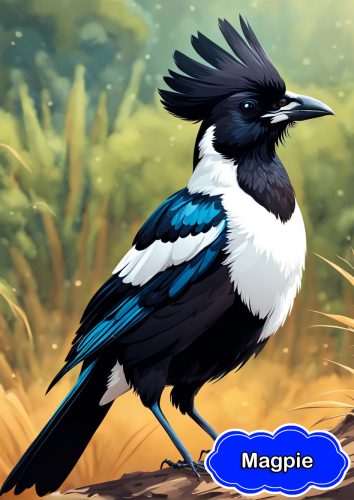
Here are some lesser-known facts about magpies:
- Highly Intelligent: Magpies are known for their remarkable intelligence. They are capable of problem-solving, tool use, and even recognizing themselves in mirrors, which is a sign of self-awareness.
- Complex Social Structure: Magpies are social birds that often live in groups. They engage in cooperative behaviors, such as mobbing predators and defending their territory as a collective.
- Vocal Abilities: Magpies have a diverse range of vocalizations, including whistles, clicks, and chattering sounds. Their complex vocal repertoire helps them communicate effectively within their social groups.
- Cultural Significance: In various cultures, magpies are seen as symbols of good luck or bad omens. Their black-and-white plumage and distinctive calls have inspired numerous myths and folklore.
- Nesting Behavior: Magpies build elaborate nests, often lined with mud and plant materials. They are known to reuse and expand their nests year after year, creating large structures that can house multiple generations.
- Dietary Variety: Magpies are omnivorous and have a diverse diet that includes insects, small mammals, fruits, and even carrion. Their adaptability in feeding allows them to thrive in various environments.
- Seasonal Behavior: During the breeding season, magpies can be quite aggressive in defending their nests, often dive-bombing perceived threats. This protective behavior is especially noted in the spring.
- Mimicry Skills: Some magpies are excellent mimics and can imitate the calls of other birds and animals. This skill can help them blend into their environment and avoid predators.
- Long Lifespan: Magpies can live for several years in the wild, with some individuals reaching over 10 years of age. Their intelligence and adaptability contribute to their longevity.
- Conservation Status: While many magpie species are common and widespread, some populations face threats from habitat loss and changes in land use. Conservation efforts are important for maintaining healthy populations.
These fascinating aspects highlight the intelligence and ecological roles of magpies!
More resources:
Animals Coloring and Learning eBook
Animals Free Fun Learning eBook
Notes:
– All materials are strictly for personal use only.
– Do not reproduce and/or redistribute any part of these materials.
– Use these materials under parents’ and/or guardians’ guidance/supervision/approval.
![]()